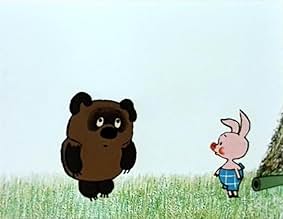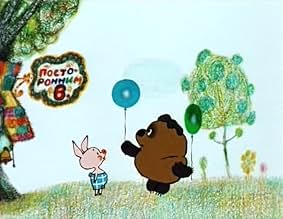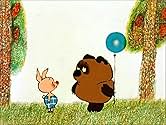Vinni-Pukh
- 1969
- 11min
VALUTAZIONE IMDb
8,2/10
5165
LA TUA VALUTAZIONE
Aggiungi una trama nella tua linguaA Soviet version of Winnie-the-Pooh. His first adventure is a desperate attempt to get to honey in a bee hollow. He is ready to take decisive action.A Soviet version of Winnie-the-Pooh. His first adventure is a desperate attempt to get to honey in a bee hollow. He is ready to take decisive action.A Soviet version of Winnie-the-Pooh. His first adventure is a desperate attempt to get to honey in a bee hollow. He is ready to take decisive action.
- Regia
- Sceneggiatura
- Star
Evgeniy Leonov
- Vinni-Pukh
- (voce)
- (as E. Leonov)
Iya Savvina
- Pyatachok
- (voce)
- (as I. Savvina)
Vladimir Osenev
- Narrator
- (voce)
- (as V. Osenev)
Recensioni in evidenza
I remember one day, at my local Library and while I was looking for some foreign cult titles in the Video/DVD section, I came across some anthology of animated titles from Russia and former Soviet Countries and one of them, were three "Winnie the Pooh" titles. I had to check them out, to see what they were like.
And to my surprise, most of the stories in these three animated shorts, are closely based off the original A.A. Milne books. The only thing missing was the Christopher Robin character (rumor has it by request that the real life Chris Milne, whom this character was based on, was uncomfortable with his fame and thus, wanted the studio to exclude Christopher Robin). But it is very good and nice details in the drawings and animation. I was rather pleased.
But I just wish that all three of the Russian "Winnie the Pooh" films would be more available to the public outside of Russia and the former Soviet countries. That would be sooooo nice!
And to my surprise, most of the stories in these three animated shorts, are closely based off the original A.A. Milne books. The only thing missing was the Christopher Robin character (rumor has it by request that the real life Chris Milne, whom this character was based on, was uncomfortable with his fame and thus, wanted the studio to exclude Christopher Robin). But it is very good and nice details in the drawings and animation. I was rather pleased.
But I just wish that all three of the Russian "Winnie the Pooh" films would be more available to the public outside of Russia and the former Soviet countries. That would be sooooo nice!
Put aside the character we Americans are used to and you give permission to enjoy the story. It's the classic Winnie, given a Russian sense. As usual, he lives his life to ingest as much honey as he can lay his paws on. Obviously, it is the Milne character with all the subordinating cast.
Animators in the Soviet Union never really cared about copyright. Their work was typically destined to be released only in their own country, and so there seemed little reason to bother with gaining permission from the likes of Dr. Seuss {as in Alexei Karaev's 'Welcome (1966)'} or A.A. Milne. Fyodor Khitruk's series of animated Winnie the Pooh adaptations was not the first, Wolfgang Reitherman at Disney having already directed two shorts several years earlier, but they are nonetheless well-remembered by Russians who grew up watching the cartoons on television. With a cheeky, down-to-earth charm that appeals to both children and adults, the series beginning with 'Vinnie-Pukh (1969)' has since developed something of a cult following, and are considered by many to decisively surpass their Disney counterparts, however uneasily they may fit into the official canon. The animation itself is somewhat coarse and minimalistic, but this all adds to the charm of it all, with the story and characters coming to life as though they have just stepped out of a picture-book.
The first film runs just 11 minutes in length, and follows the efforts of Winnie and Piglet to steal precious honey from a hive of fiercely territorial bees. Demonstrating a keen sense of creativity, Winnie decides to borrow a blue balloon from Piglet's home, the idea being that, after the balloon carries him to the top of the oak tree, the bees will mistake the balloon for a piece of sky, and Winnie for a darkened rain cloud. It was a good idea in theory. One doesn't usually associate Winnie the Pooh with intelligence, but the Russian version does exhibit a sharp sense of wit, and Evgeni Leonov brings a wonderful amount of humour and character to his voice-acting. Piglet (or Pyatachok, voiced by actress Iya Savvina) is placed cute and innocent, enthusiastically submitting to Winnie's every command, and occasionally lamenting at the loss of his beloved blue balloon. For fans of Soviet animation, or animation in general, 'Vinnie-Pukh' is a charming and witty moving storybook.
The first film runs just 11 minutes in length, and follows the efforts of Winnie and Piglet to steal precious honey from a hive of fiercely territorial bees. Demonstrating a keen sense of creativity, Winnie decides to borrow a blue balloon from Piglet's home, the idea being that, after the balloon carries him to the top of the oak tree, the bees will mistake the balloon for a piece of sky, and Winnie for a darkened rain cloud. It was a good idea in theory. One doesn't usually associate Winnie the Pooh with intelligence, but the Russian version does exhibit a sharp sense of wit, and Evgeni Leonov brings a wonderful amount of humour and character to his voice-acting. Piglet (or Pyatachok, voiced by actress Iya Savvina) is placed cute and innocent, enthusiastically submitting to Winnie's every command, and occasionally lamenting at the loss of his beloved blue balloon. For fans of Soviet animation, or animation in general, 'Vinnie-Pukh' is a charming and witty moving storybook.
Unless you've read any of A.A. Milne's original works, then your image of Winnie the Pooh is the treacly cartoons released by Disney. But there was another set of cartoons depicting the honey-obsessed bear. This set got produced by Soyuzmultfilm, a studio in the Soviet Union, and their Pooh looks more ursine than the Disney one. The first one was "Vinni-Pukh" (the Russian pronunciation of the bear's name). In this one, Pooh wants to get some honey out of a beehive, and so he enlists Piglet's help (Piglet is called Pyatachok in Russian). Naturally there are a few snags. I particularly liked Pooh's nonsense singing. This particular cartoon doesn't include the rest of the characters. It's all about Pooh, Piglet, and the bees. Anyone interested in the history of animation can't afford to miss this short.
Vinni Pukh is one of the best soviet cartoons. There are actually very few good soviet cartoons and this is one of them. Vinni Pukh is a beautifully drawn cartoon with its own unique atmosphere, good characters, beautiful music and entertaining story. Vinni Pukh himself is an amazing character, he is cute and beautifully looking. He also is very creative and fun person. The cartoons third episode though contains dramatic segements releated to a newly introduced character which i did not like. Overall the cartoon is very good and absolutely worth watching especially as it is fairly short. One of the controverses though is Pitachok's look as he doesnt look like an actual pig and his eyes are also weird. So there are one-two few "flaws" and thats it for this cartoon. And yeah this cartoon surely beats the american version. Just go ahead and watch it especially if youre russian speaking.
Lo sapevi?
- QuizWhen "Winnie the Pooh and the Blustery Day" (1968) won best short film at the Academy Awards in 1969, Wolfgang Reitherman told Fyodor Khitruk that, despite winning, he preferred the Soviet Union version.
- Citazioni
Vinni-Pukh: Why do bees exist?
- ConnessioniFeatured in Chto? Gde? Kogda?: The Sixth Game (1982)
I più visti
Accedi per valutare e creare un elenco di titoli salvati per ottenere consigli personalizzati
Dettagli
Contribuisci a questa pagina
Suggerisci una modifica o aggiungi i contenuti mancanti

Divario superiore
By what name was Vinni-Pukh (1969) officially released in India in English?
Rispondi




















